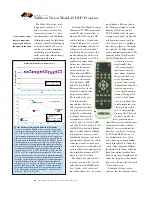
that the Model 40 is capable of
950 ANSI lumens and has a con-
trast ratio of 1,600:1. Since Vidikron
is now owned by Runco, they’ve
adopted Runco’s Cinema Standards
Measurement System (CSMS)
specification standards, which are
more realistic in terms of light-
output and contrast-ratio ratings.
In film, we measure
light in foot-lamberts, so
Runco has decided to
include foot-lambert
measurements in their
specifications, as well as
real-world ANSI-lumen
specifications after
proper calibration. This
is the first time I’ve ever
reprinted even a portion of a man-
ufacturer’s spec sheet, but it’s
worth illustrating, as it represents
real information that will aid in
your home theater’s design. If you
look closely at the spec sheet,
you’ll see the CSMS specifications
under “Light Output”: home theater
calibration: 480 ANSI lumens;
17.9 foot-lamberts (ft-L). Under
“Contrast Ratio,” the CSMS spec is
a much more realistic 148:1. The
company takes it one step further
by recommending a screen size
between 72 and 96 inches wide,
even though the projector can pro-
ject images up to 200 inches wide.
I have to hand it to Runco/Vidikron
for taking this bold step. I’ve long
been frustrated with video-display
manufacturers’ marketing depart-
ments for boasting ridiculous
light-output and contrast-ratio
numbers. When you measure
these two specifications in an
actual home theater environment,
it becomes crystal clear that virtu-
ally all of these published specifi-
cations are totally bogus.
After I’d completed a full ISF-
style calibration for both NTSC
and HDTV sources, I sat back
and watched a variety of DVDs
and HDTV material. Chapter 31
of
Charlotte Gray
, still one of my
favorite reference DVDs, had great
snap and detail, plus very good
color saturation. In the beginning
of this chapter, a train travels
through the French countryside,
and there was some visible low-
level noise. This noise was more
prevalent in darker scenes, such as
the love scene between Charlotte
and the young British officer in
chapter 4. In fairness to Vidikron,
I’ve seen this low-level noise on
virtually every one-chip DLP pro-
jector, and I attribute it at least in
part to DLP technology. Part of
the problem could also be in the
video processing.
Chapter 4 of
Training Day
looked
excellent. Denzel Washington’s
black car looked really black, which
is a testament to the Model 40’s
excellent black-level performance.
DLP still can’t do black like a CRT,
and it probably never will. How-
ever, the new HD2 chip takes DLP
performance to another level. I
dare say it takes DLP to an accept-
able level for 99.9 percent of home
theater enthusiasts.
HDTV from my Dish
Network satellite feed
looked mostly awesome.
Bright scenes looked
really good, but darker
scenes were plagued by
low-level-noise problems.
In particular, I watched
Armed
and Dangerous
on the HBO HD
channel and
Harlan County War
on Showtime HD. I fired up my
reference Runco DTV-991 for a
quick comparison, and I found
the material to look quite clean
through this CRT projector. Unfor-
tunately, I was unable to evaluate
the Model 40’s HDTV performance
using its DVI input. However, I’ve
had enough experience in the field
calibrating digital displays using
both the component video and
the DVI inputs, and I don’t doubt
that the DVI input looks a lot
cleaner than an analog component
connection on a digital display. I
suspect that HD material would
have looked a lot better using the
Model 40’s DVI connection.
Vidikron looks strong again.
Their Vision Model 40 is a very
respectable player in the 1,280-by-
720 one-chip DLP-projector cate-
gory. Good video processing,
black-level performance, and color
decoding all add up to excellent
performance. There’s no doubt
that the Model 40 does a lot right,
and it’s a truly impressive DLP
projector, especially when you
consider its price. At $8,995 with
the short-throw lens and $9,995
with the long-throw lens, the
Model 40 is one of the most rea-
sonably priced DLP projectors in
its class, making it one of the
best values in its category.
Vidikron Vision Model 40 DLP Projector
G E A R G U I D E
114
Home Theater /
November 2003 •
www.hometheatermag.com
Vision Model 40 DLP Projector $8,995
With the Long-Throw Lens
$9,995
Vidikron
(510) 324-5900
www.vidikron.com
Dealer Locator Code VID
Vidikron Vision Model 40 DLP Projector
• Good video processing with
3:2-pulldown detection for
film-based material
• Excellent flexibility for setup
and optimizing picture quality
for all sources
• Great value for the dollar
HIGHLIGHTS





















